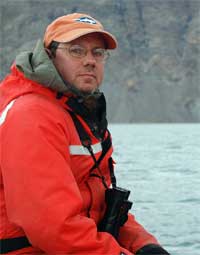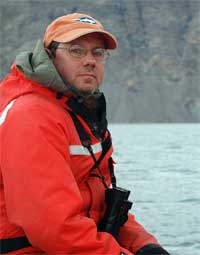 KINGSTON, R.I. – February 18, 2013 — University of Rhode Island publicist and natural history writer Todd McLeish sometimes must go to extremes to conduct research for his books. For his latest volume, Narwhals: Arctic Whales in a Melting World, he spent time at a whale hunting camp near the northern tip of Greenland with Inuit hunters who spoke little English and who ate little but raw whale blubber, uncooked bacon, and bread.
KINGSTON, R.I. – February 18, 2013 — University of Rhode Island publicist and natural history writer Todd McLeish sometimes must go to extremes to conduct research for his books. For his latest volume, Narwhals: Arctic Whales in a Melting World, he spent time at a whale hunting camp near the northern tip of Greenland with Inuit hunters who spoke little English and who ate little but raw whale blubber, uncooked bacon, and bread.
“That may have been my most challenging experience, partly because of the food and communication issues but mostly because I was there to observe a narwhal hunt, which, to a wildlife lover like me, was an awful thing to witness,” said McLeish, a resident of Burrillville who grew up in North Kingstown. “But in order to tell the complete story of the narwhal, I had to learn about subsistence hunting firsthand.”
Narwhals are small whales most notable for their 8-foot long spiral tusk, a tooth that grows through their upper lip and is used by males to maintain social order. The tusk plays a role in the unicorn myth, too, and they can sell for thousands of dollars (though it is illegal to own one in the U.S.)
McLeish, who wrote two previous books about rare wildlife in New England, said he has been fascinated by narwhals since childhood. In addition to his trip to Greenland, he also spent two weeks with Canadian researchers in a camp 400 miles north of the Arctic Circle as they sought to trap narwhals and attach satellite tracking devices on them to monitor their migration.
“It was the middle of summer, but still only 35 degrees, we were in 24-hour daylight, and we had to stand guard around the clock to watch out for polar bears,” he said. “Every six or eight hours a group of about 200 narwhals swam by our camp, and it was pretty amazing to see and hear them parade by. And for the whole two weeks I was there, the whales successfully avoided being caught in our nets.”
McLeish’s book, published by University of Washington Press, took four years to complete and features interviews with dozens of experts around the globe. In addition to examining the issue of subsistence whale hunting, he moderates a debate between biologists and a dental researcher about the purpose of the narwhal’s tusk and discusses the numerous potential threats the whales face from climate change.
“The biologists I spoke to said that narwhals are the Arctic marine mammal most threatened by climate change because they are the least adaptable to a changing environment. They are ice dependent animals that spend the winter feeding in waters 98 percent covered by ice, “ McLeish explained.
In addition, he said that the warming Arctic will open up more of the whale’s habitat to commercial fishing for the same species the narwhals eat. Expanding oil and gas exploration in the same area brings the threat of oil spills as well as noises that could disturb the communication and behavior of the skittish whales.
McLeish will give numerous presentations around the region about his book this spring and summer, beginning with a talk at the Harvard Museum of Natural History March 2. His first public talks in Rhode Island are at the South Kingstown Land Trust March 14 and the Audubon Society of Rhode Island in Bristol March 21.
He is beginning work on his next book, which he is tentatively calling The Underground Lives of North American Wildlife and features wildlife that spend much of their time underground. He has already had adventures with scientists studying badgers in Wisconsin, desert tortoises in Nevada and truffles in Oregon, and will include chapters on burrowing owls, spadefoot toads, cicadas, star-nosed moles and many other creatures.
For more information about McLeish’s books, visit www.toddmcleish.com.
Photo courtesy of Todd McLeish

